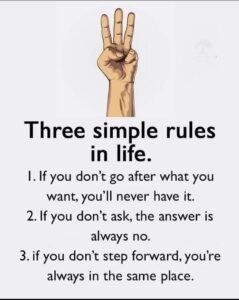Assert your right to make a few mistakes. If people can’t accept your imperfections, that’s their fault. Dr. David M. Burns
Perfection is what is ideally expected from each one of us; our parents want us to excel in academics and sports and the extracurricular activities. The expectations from teachers, friends and extended family are almost equally demanding. Subconsciously then, we have imbibed the need to be fiercely competitive, strive to be perfectionist and despise mistakes of any sort. There are broadly 3 long term negative consequences of these subconsciously imbibed thoughts .
Our fierce determination to succeed no matter what the means used. With high expectations prodding one along, the pressure to succeed and the terrible fear of failure invariably leads one to find ways and means to succeed. We may find some ingenuous loop holes, interpret the rules to suit our needs and in rare cases even resort to dubious means to succeed. The most common example is the invariably temptation to copy, be it in exams or in assignments. Bribing, cheating, swindling are the invariable scale up of this mentality that pressurizes us to seek success at any cost.
Our reluctance to accept or understand our imperfections When criticized our immediate reaction is to rationalize and often we accept the criticism with poor grace. With rare exceptions almost every time a criticism is leveled against us there is fair bit of truth in it, but alas our mind has been conditioned to accept only praise and acceptance and criticism is taboo. Our imperfections become more accentuated when we face more competition, are exposed to people having superior skills and we face challenges that daunt us. Excuses are the most favored means of deflecting criticism. Fault finding, rebuttal, counter criticism, backbiting are other common means of expressing our reluctance to accept the reality of our imperfections.
Our reduced risk taking ability. The fear of not succeeding, the lack of confidence that comes from the intense pressure of expectations and the inability to accept failure as an acceptable option, forces a person to avoid taking any risks. In life taking a calculated risk is the norm but when our calculations are mentally skewed to ensuring only success then more often than not we prefer not to participate if given the option. Other times we put on a facade of participation giving up too quickly under some pretext, make excuses to prepare others not to expect too much and line up a litany of reasons to rationalize or justify failure or non participation.
All this adds to up to one leading a life filled with numerous negative emotions including remorse, regret, fear, jealousy, doubt and a feeling of inadequacy. To overcome this one has to do the following 3 things.
Learn to accept the reality. Be pragmatic about ones strengths and weakness. In every race on the tracks there can be only one winner, yet there will be numerous participants who despite their reservations about being the best believe they have a chance for they are one of the best. There are many who participate to gain experience and learn from it.
Be less critical both of self and others. We are often harsh on ourselves especially when we make silly mistakes. In the same vein we can be extremely harsh with others who we perceive to have made silly mistakes. This attitude minimizes our ability to trust ourselves, makes us habitually see the pitfalls and does not infuse enthusiasm to attempt. By being less critical, more tolerant and heartily embracing the outcome of our efforts and that of other irrespective of the results, we can emerge from our self imposed hiatus.
Prepare and participate enthusiastically, embrace failure with grace and try again with fortitude and self belief. Unless one has taken efforts to succeed mere participation won’t result in success. Just as studying is a prerequisite even for the most brilliant to succeed it is essential that one prepares before enthusiastically participating. Thereafter the outcome should not be seen as indication of either a comprehensive success or a decisive failure but merely as a fair outcome. Let not failure impede your will to try again nor let a fluke victory be seen as the pinnacle of success. What is important is to try to exceed the benchmarks attained.
Remember: The greatest mistake you can make in life is to be continually fearing you will make one. Elbert Hubbard
Action Points:
- Choose the one or two aspects of your life that you are most criticized for and try to resolve the issue by trying consistently for a month. Eg. Reducing your weight/ girth or a bad habit of being critical of everything / your tendency to overuse certain words like you know, ummm., hmm, you see etc.
- Try the following simple activities and see if you can overcome your own inhibitions.
- Thread a needle
- Learn 3 new words every week and use it in your communication
- Find something positive everyday in someone you dislike
- Experiment with something goofy eg. Wearing mismatched clothes/ wearing a hat to work (if that is not part of the attire)/ surprising your friends/ colleagues with some goodies for no particular reason.
This post is courtesy www.actspot.com
You are also invited to visit our Inspirational and Motivational Blog www.poweract.blogspot.com






This Post Has 0 Comments
Very well written
Thanks Khalid for your feedback and warm appreciation of the contents of this post. Do keep writing in and giving your valuable feedback. You are also welcome to rate the blog posts and share the same with your email contacts/ facebook and twitter friends.
Regards
Jacob